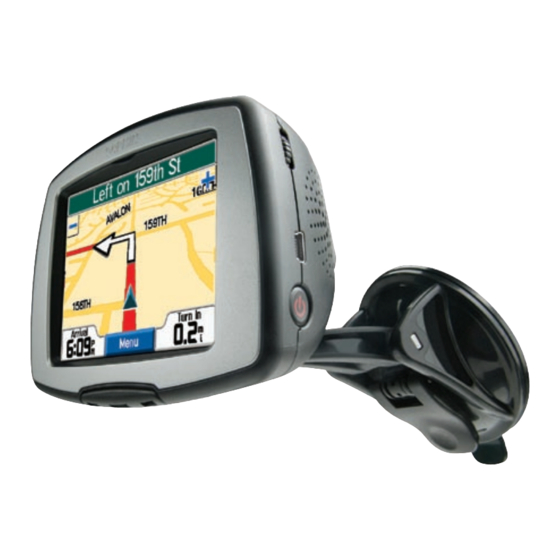Personal Navigation System: Garmin C330
In 2003 Garmin launched the iQue line of integrated PDA-GPS receivers. On Oct 31, 2005 the
iQue M4 became the first PDA that does not require a PC to preload the maps. It came with
built-in maps of North America.
In October 2005, Garmin released the StreetPilot i-Series, compact GPS navigators which come
in three models, i2, i3, i5. The i2 has a monochrome display, and maps need to be loaded on a
Transflash card. The i3 is similar to the i2, except it has a color screen. The i5 has a color screen
and the maps come preprogrammed into the device. More advanced versions of the StreetPilot
include the c-Series, some of which sport large colour touchscreens, FM traffic notifications,
support for weather and information updates from MSN Direct, and Bluetooth support.
In October 2006, Garmin began shipping the nüvi 660, a pocket-size widescreen successor to
their nüvi 300 series. The 660 added bluetooth, FM transmitter, enhanced screen brightness and
screen size, all in a small "flat" size.
One of the Most Poular of the Garmin GPS units are the Etrex series. These GPS units are
colorful with features that differentiate with each unit.
Company's Growth
By 1995 Garmin's sales had reached $105 million, and had achieved a profit of $23 million; and
by 1999 sales had reached $233 million and profit of $64 million.
By 1999 the company's products had captured roughly 50% of the North American market share
in the market for GPS receivers used in the marine and outdoor recreation markets, according to
a market study conducted by Frost and Sullivan. Its own internal estimates showed that its
aviation retrofit products had a 59% market share, and that among portable aviation GPS
products, it controlled 76% of the market.
By 2000 Garmin had sold three million GPS devices, and was producing 50 different models. Its
products were sold in 100 countries, and carried by 2,500 independent distributors. As of August
22 2000, the company held 35 patents on GPS technology. By the end of June 2000, the
company employed 1,205 people: 541 in the United States, 635 in Taiwan, 29 in the United
Kingdom.
The company started trading publicly on the NASDAQ exchange on December 8, 2000. At that
time Burrell owned 19,911,155 shares. Kao owned 20,352,803 shares. Together their holdings
accounted for 45% of the stock in Garmin. Kao's brother,
Ruey-Jeng
Kao, an attorney in Taipei,
owned another 7,984,109 shares, which when combined with Burrell's and Kao's shares
constituted 54.22% of the shares outstanding.
In 2003, Burrell retired as Garmin's Chief Executive Officer and in 2004 retired as Chairman of
its Board of Directors. He is now Chairman Emeritus. Kao became CEO in 2003, and Chairman
in 2004.
Matthew Kimball – Retail Sales Trainer - Simulation Exercise
Garmin C330 FG (PANEL)v1.0
14 of 16

